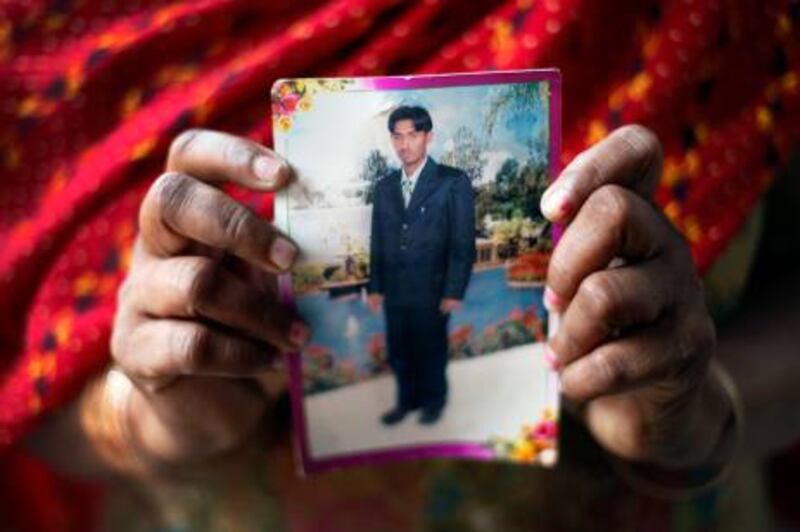DUBAI // Seventeen men convicted of killing a labourer in an alcohol bootlegging war will escape the death penalty after the victim’s family accepted an increased blood-money payment of 80 million Pakistani rupees – almost Dh3.5 million.
The payment replaces a Dh442,000 diyyah offer they rejected before. The agreement was presented to Sharjah Court of Appeal yesterday and is expected to bring to a conclusion a case that has dragged on for more than two years.
MORE UAE NEWS: Our pick of today's top local news stories
Unpaid workers on strike at Dh7bn Reem Island project More than 300 workers on the Tameer Towers project have not been paid since April and have stopped working on the development. Read article
Most private schools hold fees steady Fees rise an average of 12 per cent but only in 60 schools across the capital. Read article
Modern icons: towers that bend space and light The Etihad Towers are not yet finished but they already dominate in the Ras Al Akhdar district. Read article
[ MORE UAE NEWS ]
Lawyers believe a final judgment may be issued as early as next week, and the men could be back with their families in months.
Presiding over yesterday’s hearing, which lasted less than ten minutes, Judge Abdullah Yousef Al Shamsi gave defence lawyers a week to present an official waiver from the family relinquishing Al Qasas rights — a Sharia provision that allows the relatives of murder victims to demand the death penalty, which they can waive by forgiving those convicted of the crime.
The latter option is often exercised in exchange for blood money. The court will reconvene on July 27 to receive the release papers.
The 17 Indians were found guilty in March 2010 of beating to death Misri Nazir Khan, a Pakistani, in the Saaja industrial area of Sharjah in January 2009.
“Money will never bring him back,” said Sarfaraz Ahmed, 30, the victim’s brother.
“He was my brother, my blood and that pain of losing him will remain with us for life. My aged parents have been crying since we accepted this money. They feel they have sold their son. Unfortunately, it is a compulsion, and we have to look out for the welfare of the entire family.”
Mr Ahmed said the family had decided to accept the money after elders in their village convinced them to forgive the 17 Indians. Some of it will be used for the education of Mr Khan’s three-year-old daughter.
Once the compensation is paid to Mr Khan’s family, the court is expected to waive the death penalty. The 17 men — 16 from Punjab and one from Haryana — would have to serve time in jail for murder, but their lawyers said they expect them to be released soon, since they have already spent more than 26 months in prison.
“The death sentence will be waived,” said Bindu Suresh Chettur, the legal representative appointed by the Indian government. “The men will be released as soon as the money is settled.”
Ms Chettur said there was no evidence to prove the men were guilty. “The court asked both parties to come together and the petitioners have settled. Our stand is that they are innocent. The prime witness turned hostile, and there is no DNA match to prove they committed the murder.”
The Indian hotelier and philanthropist SP Singh, who has been involved in the negotiations on behalf of the convicted men, said yesterday that Dh45,000 had been paid to the victim’s family in Pakistan on Tuesday as a token amount.
“We presented a copy of the receipt of this token money to the court,” Mr Singh said after the court hearing.
He said he would strive to raise the remaining money before the next hearing.
“I will be paying one million dirhams, and the remaining money is being raised by Indian businessmen in Dubai and India,” said Mr Singh, who has in the past paid blood money and secured the release of several men from Punjab. Most of them had been accused of bootlegging.
Mohammed Ramzan, the Pakistani family’s representative, had previously turned down compensation offers because of what he described as inconsistency and lack of clarity on the part of Indian negotiators.
Yesterday, however, Mr Ramzan said: “The family accepted the token amount yesterday in Pakistan. The court was told that the entire blood money will be paid within a week.”
The Indian consulate in Dubai said: “We have no objection to the path of compromise, which is an accepted judicial norm, invoked by the community on behalf of the accused.”
* With additional reporting by Yasin Kakande
Convict’s families rejoice
DUBAI // The families of the 17 men who have avoided the death penalty rejoiced yesterday over news of their loved ones’ pending release.
Family members were counting the days until the men returned home.
“We are very happy that the family has accepted the settlement,” said Harbans Singh, the father of S?S, one of the killers.
“I cannot wait for my son to come back. I will go to receive him from the airport. We will now never send him overseas to work. He will live and work in India.”
Ranjith Kaur, the wife of D?P, another of the convicted killers, said: “We were very anxious how this money would be raised. But I am glad that he [the Indian hotelier and philanthropist S?P Singh] has helped us.
“I visited my husband in jail last year. When he gets here it would be the happiest day of our lives. I have told my children that their father is coming back home. They do not know he is in prison. They think he is working here and are very excited to see him again.”
Balraj Singh, the father of H?S, said: “It is great that this issue has settled. We don’t know when they will come back but hope it will be very soon.”
* Preeti Kannan






